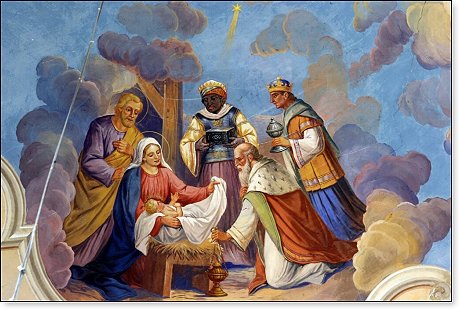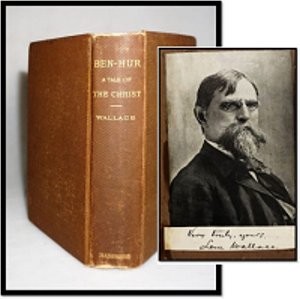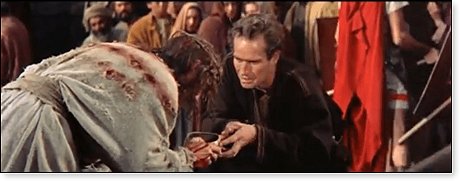
Rev. Mark H. Creech

It was published in November of 1880 and was considered the most influential Christian book of the nineteenth century. It was a best-selling novel and even surpassed in sales Harriet Beecher Stowe’s Uncle Tom’s Cabin. It was on the best-seller list until 1936 when Margaret Mitchell’s Gone with the Wind was published. Pope Leo XIII blessed this book – an honor no other novel has received. The book inspired three motion picture productions, one in 1925, one in 1959, and one in 2016. Furthermore, re-runs on television of the 1959 film are not uncommon during Christmas. Can you guess what book is being described?
You were right if you guessed Ben-Hur: A Tale of the Christ, written by Lew Wallace. It’s an incredible story about a Jewish prince enslaved by the Romans who becomes a charioteer. Ben-Hur’s life story parallels the Gospel narrative of Jesus’ birth, crucifixion, and resurrection.
Here’s a portion of what Wallace wrote about the three wise men coming to visit the newborn King, Jesus:
“That evening, before sunset, some women were washing clothes on the upper step of the flight that led down into the basin of the Pool of Siloam (under the wall of Jerusalem).
“‘Peace to you,’ one of the newcomers said.
“‘What news have you?’
“‘Then you have not heard?’
“‘They say the Christ is born.’
“‘Does anybody believe it?”
“‘This afternoon three men came across Brook Cedron on the road from Shechem. Each one of them rode a camel spotless white, and larger than any ever before seen in Jerusalem.”
“The eyes and mouths of the auditors opened wide.
“‘To prove how great and rich the men were,’ the narrator continued, ‘they sat under awnings of silk; the buckles of their saddles were of gold, as was the fringe of their bridles; the bells were of silver, and made real music. Nobody knew them; they looked as if they had come from the ends of the world. Only one of them spoke, and of everybody on the road, even the women and children, he asked this question: ‘Where is he that is born King of the Jews?’ No one gave them an answer – no one understood what they meant; so they passed on, leaving behind them this saying, ‘For we have seen his star in the east, and are come to worship him.’
“‘Where are they now?’
“‘At the khan. Hundreds have been to look at them already, and hundreds more are going.’
“‘Who are they?’
“‘Nobody knows. They are said to be Persians – wise men who talk with the stars – prophets, it may be, like Elijah and Jeremiah.’
“‘What do they mean by King of the Jews?’
“‘The Christ, and that he is just born.’
“One of the women laughed, and resumed her work, saying, ‘Well, when I see him, I will believe.’
“Another followed her example: ‘And I – well, when I see him raise the dead, I will believe.’
“A third said quietly, ‘He has been a long time promised. It will be enough for me to see him heal one leper.’
“And the party sat talking until the night came, and, with the help of the frosty air, drove them home.”
 Early in his life, Wallace didn’t care much for church, but when he heard the Christmas story about the three wise men from his favorite teacher, he was fascinated by it.
Early in his life, Wallace didn’t care much for church, but when he heard the Christmas story about the three wise men from his favorite teacher, he was fascinated by it.
Years after serving in the Mexican-American and Civil Wars, Wallace decided to write a magazine article about the wise men.
“I had no convictions about God or Christ. I neither believed nor disbelieved in them,” he said. However, once Wallace embarked on writing about the three potentates, he found himself possessed with a spirit of reverence.
While working on the magazine article, Wallace had a chance meeting with the famous atheist of his day, Robert Ingersoll. Ingersoll knew the Bible well, but only for the purpose of refuting it. Wallace’s exchange with Ingersoll made him feel embarrassed at his poor knowledge of the Scriptures.
“My ignorance of it was painfully a spot of deeper darkness in the darkness,” Wallace said, “I was ashamed of myself.”
Wallace also realized he was ill-equipped to write about the three wise men. And so, he dived deeply into the Bible, researching it carefully.
While making his inquiries, he created the character of Judah Ben-Hur – a fictional story about a man who witnesses the events of Christ’s life told in the Gospels. Wallace said he started to see Christ through Judah-Ben Hur’s eyes and was convinced that he was the Messiah.

“Long before I was through with my book, I became a believer in God and Christ,” Wallace said.
My father was similarly converted to Christ. He was riding in a carpool to work when a co-worker who was part of a cult started sharing his beliefs. My father didn’t understand why, but he felt what his co-worker was sharing wasn’t right, precipitating his own thorough search of the Bible. Meanwhile, he also met a new preacher in town who lived just down the street from him – someone who could answer his numerous unanswered questions.
Probing the Bible, seeking the pastor’s wise counsel, and carefully considering the facts, my father was enabled to repudiate the cult errors of his fellow rider in the carpool. However, the most important thing that happened was, for the first time in his life, my father became convinced that not only was Jesus humanity’s Messiah, but he needed Jesus to become his own Savior.
My father’s conversion led to my mother’s. Years later, I also would trust Christ, and my younger sister would too.
What about you? Do you believe, not with mental assent alone, but with your whole heart, that the babe in Bethlehem’s manger is the world’s Savior? More importantly, are you convinced he can save to the uttermost, forgive and cleanse away all the guilt of your sins, put you in right relationship with God, transform your life into one of meaning and purpose, and one day receive you into his eternal kingdom? Have you experienced the joy of this confidence, which only a personal relationship with Christ as Savior can give?
I don’t know who made this quote. Nevertheless, I found it in a book well over a century old, titled Thirty Thousand Thoughts. It says of Jesus:
Here is a Man born and reared in obscurity, with no advantages of education; without rank, wealth or associates; hated by the leading men of his time; a man who died by the hands of the law, and was buried by charity; and yet kings and emperors have been anointed in his name; the most gorgeous temples on the face of the earth have been consecrated to his worship; millions upon millions believe there is eternal salvation through Him…and there is no name in heaven or earth that is spoken with the same reverence as the name of Jesus.
Like the characters in Lew Wallace’s novel, Ben-Hur, you may have heard that the Messiah has come. You may have desired evidence showing he is indeed the Christ. Or, you might have been inclined to surrender to the conviction that he is Lord and deserves your allegiance, but you have never followed through by giving him your life.
When carefully examined with an open mind and heart, the preponderance of the evidence altogether ought to convince you beyond a reasonable doubt that Jesus is the Great Redeemer. He alone can save the world. He alone can save you.
Let the Christ of Christmas be born in you.
Merry Christmas!
© Rev. Mark H. CreechThe views expressed by RenewAmerica columnists are their own and do not necessarily reflect the position of RenewAmerica or its affiliates.




















